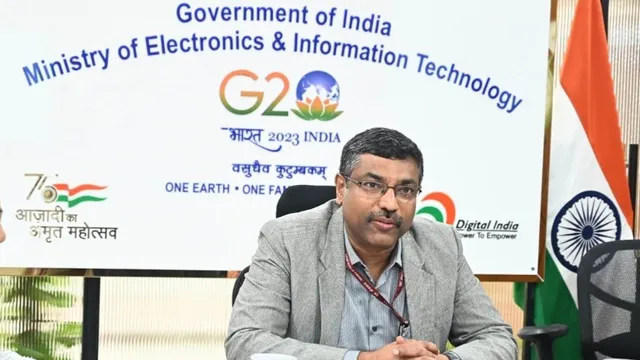- By Alex David
- Sat, 11 Oct 2025 05:33 PM (IST)
- Source:JND
As India’s technology sector draws growing global attention, the government is making one thing clear — being Indian isn’t enough; being world-class is the goal.
S Krishnan, Secretary of India's Ministry of Electronics and IT (MeitY), stressed to Moneycontrol on the sidelines of India Mobile Congress 2025 that India aims to develop competitive technology products through competitiveness rather than protectionism. Krishnan stressed the goal is for India-based tech firms to be at equal footing with those found overseas.
“We Won’t Settle for Less Just Because It’s Indian”
Krishnan explained that while MeitY will support homegrown innovation, it won’t compromise on quality.
“We will support everything which is Indian, which is of that quality and that kind of competitiveness. But at no stage should we expect anybody in the country to settle for anything that is not best-in-class,” Krishnan said.
ALSO READ: Pixel Watch To Get Always-On Media Controls With Upcoming Wear OS 6 Update
“You can’t say this is an Indian product, but it won’t be as good as something globally available, yet please settle for it because it’s Indian. That will not be India’s case ever.”
His comments underline a crucial shift in India’s digital policy — from self-reliance for its own sake to self-reliance with global standards.
Government Adoption of Indian Tech Tools
The MeitY Secretary’s remarks come as several ministries push for wider adoption of Indian-developed digital tools, particularly Zoho’s office suite, which includes email and productivity services.
Krishnan confirmed that the National Informatics Centre (NIC) — which manages IT systems for government departments — has already migrated to Zoho Mail after a formal evaluation process.
“A little over a year ago, the entire NIC’s email system, which was previously run on other applications, shifted to a Zoho email basis after a process of price discovery and tendering. It is functioning effectively, and we’ve been quite happy with the way it’s been working,” he said.
This landmark represents a milestone in the government's broader digital transformation efforts, designed to ensure data sovereignty, reduce reliance on foreign tech giants and advance local innovation.
Focus on Ecosystem, Not One Company
While Zoho’s success has drawn attention, Krishnan was quick to clarify that the government isn’t backing any single player.
“It’s not fair to single out a single company and say we are pushing this. Our wider push will be for Indian products. There are a number of other Indian companies that are also gaining traction,” he said.
According to Krishnan, the government’s mission is to create a level playing field for multiple Indian tech firms to grow and compete globally — from enterprise software to cloud, AI, and cybersecurity.
Building Choice, Not Imposing Preference
Krishnan stressed that MeitY’s approach is about expanding choice for users, not restricting them. The aim is to encourage competition, innovation, and excellence — ensuring that India’s digital infrastructure isn’t just “Make in India,” but “Compete with the World.”
“Building Indian technology alternatives is about expanding choice, not imposing preference,” he added.
Global Investment Wave Strengthens India’s Position
Krishnan’s comments come amid a wave of foreign investment in India’s tech and AI ecosystem.
Anthropic, an artificial intelligence research firm, announced plans to establish an office in India while UK-based semiconductor firm Graphcore pledged investments of PS1 billion over 10 years, underscoring India's growing status as an incubator of innovation, AI research and semiconductor development.
ALSO READ: BluSmart’s Official Verified X Account Sparks Chaos With Fraud Allegations Amid Financial Crisis
The Bigger Picture
India's technology narrative is constantly shifting. From supporting local startups to welcoming international players, India is now focused on quality, capability, and global scale in all its technology initiatives.
Krishnan’s message captures that transition perfectly: India’s tech ecosystem will be proudly Indian — but never second-best.

